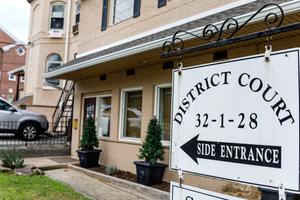Spotlight PA is an independent, non-partisan newsroom powered by The Philadelphia Inquirer in partnership with PennLive/The Patriot-News, TribLIVE/Pittsburgh Tribune-Review, and WITF Public Media. Sign up for our free newsletters.
Magisterial district judges are the gatekeepers of Pennsylvania’s legal system.
They preside over traffic cases, set bail in minor criminal cases, and rule on civil disputes involving amounts up to $12,000.
In exchange, the elected officials are paid $93,338 a year and can earn a pension and lifetime health care after serving at least 10 years.
But as a yearlong investigation by PennLive and Spotlight PA revealed, the positions come with a perk: In 2019, many of the state’s roughly 500 district judges only had courtroom appearances scheduled a few days a week.
Documenting this story involved extensive data analysis and reporting to penetrate the veil of secrecy surrounding the court system.
Like many investigative stories, the journey began with a tip.
In early 2019, sources in the criminal justice system told PennLive reporters Christine Vendel and Daniel Simmons-Ritchie that many district judges were gaming their judicial calendars.
To determine how often judges had scheduled court appearances, Vendel and Simmons-Ritchie tried to electronically scrape calendars from the website of the Administrative Office of Pennsylvania Courts. They soon discovered certain types of proceedings were missing.
Vendel and Simmons-Ritchie then requested data directly from the AOPC. The courts were reluctant, saying it would violate the state’s Clean Slate law, intended to allow residents to keep certain minor criminal cases hidden, so they weren’t haunted professionally and personally.
Simmons-Ritchie continued working the story with Vendel after he joined Spotlight PA as PennLive’s representative later in 2019.
They filed five requests before AOPC provided PennLive and Spotlight PA with data for “case events.” Case events include items such as small civil cases, search warrants, preliminary hearings. and protection from abuse orders.
As the data was delivered, Vendel and Simmons-Ritchie spent weeks analyzing and verifying its accuracy with judges. The work encompassed 3.8 million case events handled by district judges in 2018 and 2019.
But case events alone would not tell the entire story, as some are far more involved and time consuming than others. Judges could look like they were not very busy, when they were handling more complex matters.
To control this variable, the reporters requested data that identified the type of case events being heard. Vendel and Simmons-Ritchie then used a formula developed by the courts in 2011 that measured the number of case events and their complexity to generate a score for each judge’s workload.
They also requested financial disclosure forms provided by judges to assess how many had other financial or business interests outside the courtroom.
The reporters spent months interviewing nearly 40 attorneys, judges, county clerks, academics, and other sources. They quickly found few were willing to speak on the record, fearing retribution.
Many of the district judges who had the most days without court appearances declined to comment. At one point, with calls unreturned, Vendel attempted to visit several judges in Delaware County. That county’s district judges, several of whom worked as attorneys, had some of the highest number of days without proceedings.
One was actively working in his law firm when Vendel visited. Another called the president of the statewide association to complain after Vendel knocked on the door of his home. County officials refused to talk with Vendel and denied her access to public buildings, citing coronavirus restrictions.
Ultimately, Vendel and Simmons-Ritchie were able to show some district judges had a large number of days without scheduled court appearances, despite the pay and perks of the job.
The reporters found that, often, the judges with the most days without proceedings on their calendars had other business interests. And, after applying the state’s workload methodology, they found judicial workloads were wildly unequal. That left some judges doing far more work, and spending far more time in the courtroom, for the same pay and benefits as colleagues doing less.
Finally, Vendel’s and Simmons-Ritchie’s reporting revealed a process referred to as “case stacking,” in which judges schedule multiple proceedings for the same time. Stacking can force attorneys, their clients, and witnesses to wait hours before their case is heard, and miss work or use valuable paid time off.
100% ESSENTIAL: Spotlight PA relies on funding from foundations and readers like you who are committed to accountability journalism that gets results. Become a member today at spotlightpa.org/donate.
